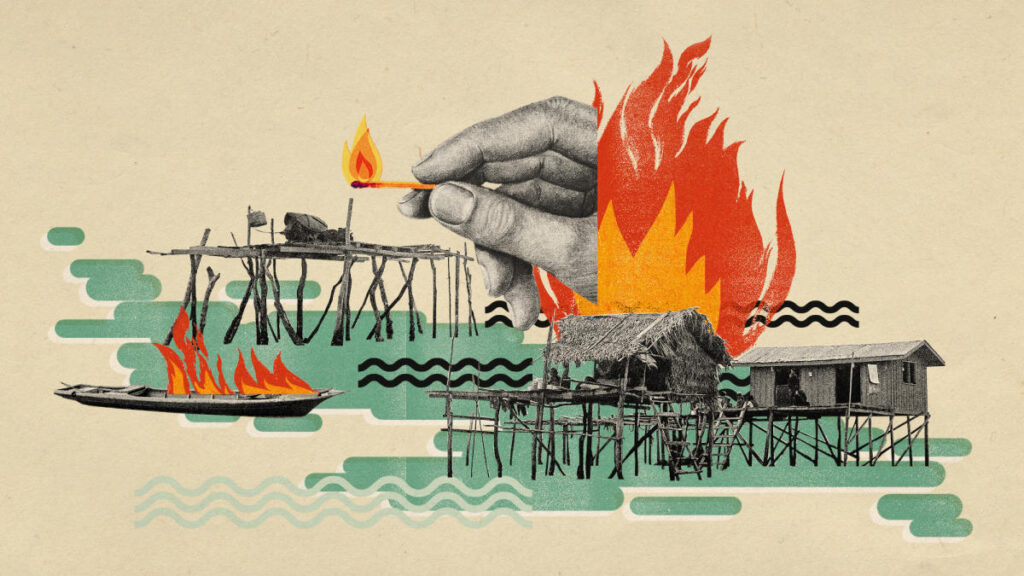Malaysian police have demolished the homes of a nomadic sea tribe off the coast, evicting hundreds of people as part of a crackdown on illegal migrants.
Famous for their freediving skillsThe Bajau Laut (“sea gypsies”) live on houseboats and stilt huts in the shallow Sulu Sea off Borneo. But because many do not register their birth, they cannot attend school or access social services. The often “poor and uneducated” stateless group faces “discrimination” from other ethnic groups in Sabah, the Malaysian state that encompasses the north Borneosaid The times.
Last month, more than 500 Bajau people were evicted from their homes in what local activists called a “government crackdown on undocumented migrants,” according to Reuters. Officials have “burned and demolished” Bajau homes on seven islands, a Sabah campaign group said. The Bajau “often live in fear” of authorities, who “make no distinction between stateless residents and undocumented migrants”.
A traditional, self-sufficient life
The Bajau people “have been cruising the waters of the Sulu Sea for centuries,” according to The guard.
First mentioned in 1521 by the Venetian explorer Antonio Pigafetta, who was the first to circumnavigate the Earth, they are believed to be the world’s only community of ‘self-sufficient sea nomads’.
The nomadic tribe “never settles on the land,” said The sun. They live on houseboats and gather shellfish from the sea floor, but also differ from their land-based counterparts in more physical ways. The “fish people” have evolved to have larger spleens, which act as a “diving tank” and store oxygen, allowing the Bajau to stay underwater for up to 10 minutes. They can also dive to 200 feet, just like a “real” Aquarius“.
“The spleen is a reservoir for oxygen-rich red blood cells, so when it contracts, it gives you an oxygen boost,” Melissa Ilardo from the University of Copenhagen told the BBC in 2018. “When they dive the traditional way, they dive repeatedly for about eight hours a day and spend about 60 percent of their time underwater.” These deep dives are performed with “only a wooden mask or goggles and a weight belt,” the announcer said.
Scientists found that both divers and non-divers in the community had spleens of similar size, about 50% larger than normal, suggesting that this is genetically determined: a product of evolution rather than a consequence of diving.
Crack down on stateless people
Life for the Bajau “became more complex in the colonial era”, according to The Guardian. Malaysia, the Philippines and Indonesia created maritime boundaries in Sulu, as part of the Madrid Protocol of 1885, “without regard for the distribution and diversity of the ethnic groups living there”.
But it was Malaysia’s Immigration Act of 1959 that “changed matters most significantly” for the Bajau. The law “made no distinction between asylum seekers, refugees, illegal migrants and undocumented or stateless persons”.
The Bajau “were in a precarious legal situation”. Many were forced to resettle near Borneo, where they “have since struggled with Malaysia’s bureaucratic processes”.
Today, many in the tribe lack legal documents and are “stripped of government privileges,” The Sun reported. “Once self-sufficient, the tribe finds itself in poverty when they set foot on land.”
According to Reuters, Malaysia has “tightened enforcement against illegal migration” in recent years, with an estimated 45,000 undocumented migrants detained since 2020, according to Human Rights Watch.
Last month, hundreds of Bajau stilt houses in a Malaysian marine park in Borneo were demolished, according to The Associated PressThe state “defended its move to demolish the unauthorized settlements,” saying the aim was to increase security and that eviction notices had been sent. But the Bajau said they had been “left homeless.”
An activist who documented the attacks on behalf of the group was arrested last week under a 1948 anti-sedition law created by the British colonial government. Mukmin Nantang’s videos, which show men in civilian clothes “toppling” Bajau homes that were later “set on fire,” have “embarrassed local authorities,” The Times reported.
“Their way of life has been affected for a long time. They were forced to move to the country,” Mukmin said. “Now their lives are being destroyed again and they are not given alternative shelters. Where are they going to go?”







